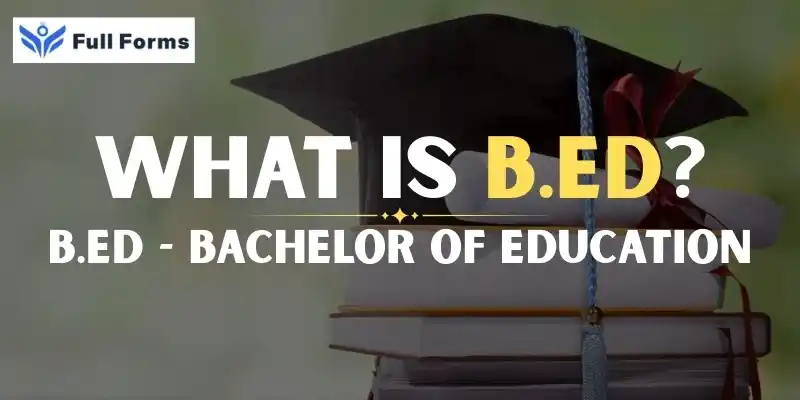Bachelor of Education
(B.Ed)

Description
Bachelor of Education (B.Ed.): One Teacher at a Time, Making the Future Better
Every society is built on education. A teacher who helped, guided, and inspired each successful student is behind them. The Bachelor of Education, or B.Ed., is one of the most important degrees for becoming a qualified teacher.
A B.Ed. is not just a degree; it is a way to become a teacher. It helps people learn how to teach, understand their students, and make learning more important. In this article, we'll talk about what a B.Ed. is, why it matters, and how it will change the way we teach in the future.
What is a B.Ed. degree?
The Bachelor of Education (B.Ed.) is a professional undergraduate degree that gets people ready to teach, usually in primary or secondary school. In India, it usually lasts for two years, but in other countries, it may last for a different amount of time.
This course is for people who want to teach in schools after they finish their arts, science, or commerce degree. For example:
- B.Sc. and B.Ed. for teachers of science
- B.A. and B.Ed. for teachers of languages or the arts
Some colleges even offer combined B.Ed. programs that let students get a B.A. or B.Sc. and a B.Ed. in four years.
Why Get a B.Ed. Degree?
How to Become a Qualified Teacher
To become a teacher in most schools, whether they are private or public, you need a B.Ed. You can't apply for teaching jobs if you don't have this degree.
Learning How to Teach
A B.Ed. is not only about schoolwork. It teaches you how to teach, how to plan lessons, how to manage a classroom, and more.
Respect and job security
One of the most stable and well-respected occupations is teaching. With a B.Ed., you can take government teaching tests and get good jobs at private schools.
Giving back to society
The next generation is greatly influenced by their teachers. A B.Ed. is a great choice if you like working with kids and want to make a difference.
Topics and Syllabus
The B.Ed. program includes both theory and hands-on training. Some of the main subjects are:
- Educational Psychology: Learning how students learn and think
- Teaching Methods: For subjects like language, math, science, and social studies
- Curriculum and Instruction: How to plan lessons that work
- How to check on students' progress through testing and evaluation
- Inclusive Education: Instructing students with exceptional needs
- Using technology in the classroom for ICT in education
Students also do teaching practice, where they go to real schools and teach with help. This hands-on experience is a big part of getting a B.Ed.
Requirements for B.Ed.
Most of the time, you need to meet the following requirements to get into a B.Ed. program:
- A recognized university must have given you a Bachelor of Arts, Bachelor of Science, Bachelor of Commerce, or another degree.
- At least 50% of the marks (this may change from school to school)
- Some colleges might give entrance exams.
There are also integrated B.Ed. programs after Class 12, mostly at state and central universities.
Job Opportunities
After you get your B.Ed., you can apply for teaching jobs in:
- Government schools (after passing tests like the CTET, TET, or state-level tests)
- Schools that are not public
- Schools from other countries
- Nonprofits for education
- Web-based learning platforms
You can also work as something else besides teaching:
- Counselor for Education
- Person in charge of the curriculum
- Researcher in Education
- Principal (after getting some experience)
You can get a Master of Education (M.Ed.) degree or work in administration, training, or policy-making in the education field to move up in your career.
After getting your B.Ed., you can take teaching exams.
To get a job in a government school, B.Ed. graduates have to pass certain tests, such as:
- CTET (Central Teacher Eligibility Test)
- TETs (Teacher Eligibility Tests) in each state
- Hiring for KVS/NVS/DSSSB
- Jobs for UPSC education officers
These tests check how well you know how to teach, how well you know your subject, and how much you know about the world in general.
Benefits of a B.Ed. Degree:
- It gives you more confidence when you stand in front of a class.
- It helps you talk to people and explain things to them.
- Encourages Creativity: To be a good teacher, you need to be creative and open-minded.
- Job Satisfaction: It's very rewarding to see students learn and grow.
Concluding remarks
Beyond deeming the diploma the job of educating, children’s learning the bachelor’s degree in education stands to advance a whole lot more. In a world wherein ascent hangs on education, it’s the teacher who shapes the future. With the knowledge, abilities, and experience that a B.Ed. will provide, you can be that guiding light.
If you love learning, helping people, changing people’s lives then B.Ed. is for you. It maybe the perfect start to a lifetime of learning.
